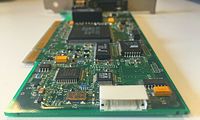
Photo from wikipedia
Based on an event-triggered control strategy, the stabilization of a linear system with disturbance is the purpose of this article. In this article, we first introduce a newfangled event-triggered control… Click to show full abstract
Based on an event-triggered control strategy, the stabilization of a linear system with disturbance is the purpose of this article. In this article, we first introduce a newfangled event-triggered control with a linear diffusive term and discontinuous sign term. Then, a class of event-triggered conditions, whose threshold contains a constant term and a sampled state term, is provided for guaranteeing the stability of a disturbed linear system. The event could be directly triggered to change the control information by violating the event-triggered condition when packet losses during control information transmission are defaulting. This means that event-triggered control can markedly economize on resource waste and communication cost. In addition, the interexecution time, which is determined by the event-triggered condition, is proved to have a uniform positive lower bound to guarantee that Zeno behavior does not occur. In the presence of packet losses, we estimate the maximum allowable number of successive packet losses to maintain the desired performance of the system. Finally, the validity of the theoretical results is substantiated by an example.
Journal Title: IEEE Transactions on Control of Network Systems
Year Published: 2022
Link to full text (if available)
Share on Social Media: Sign Up to like & get
recommendations!